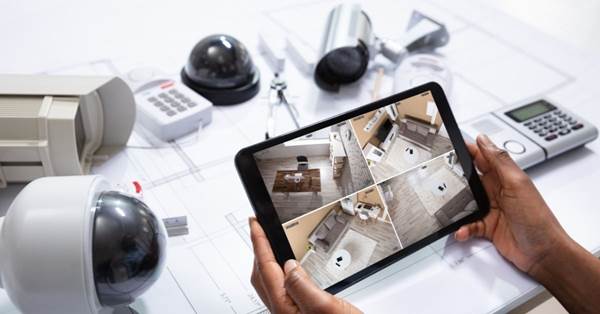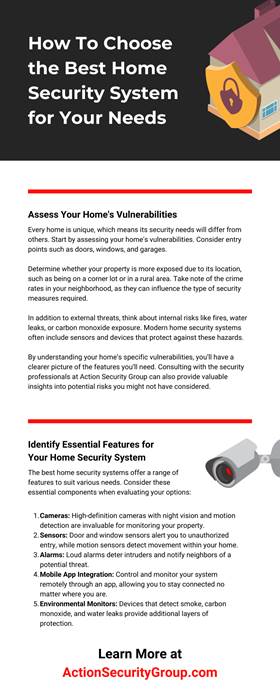How To Choose the Best Home Security System for Your Needs

Securing your home is one of the most critical steps you can take to protect your loved ones and belongings. Thanks to technological advancements, home security systems have become more accessible, customizable, and effective than ever.
Choosing the best home security system for your needs can seem overwhelming, but with the right guidance, you can find a solution that fits your lifestyle, budget, and specific concerns. Here’s an in-depth look at the factors to consider when making this crucial decision.
Assess Your Home's Vulnerabilities
Every home is unique, which means its security needs will differ from others. Start by assessing your home's vulnerabilities. Consider entry points such as doors, windows, and garages.
Determine whether your property is more exposed due to its location, such as being on a corner lot or in a rural area. Take note of the crime rates in your neighborhood, as they can influence the type of security measures required.
In addition to external threats, think about internal risks like fires, water leaks, or carbon monoxide exposure. Modern home security systems often include sensors and devices that protect against these hazards.
By understanding your home’s specific vulnerabilities, you’ll have a clearer picture of the features you’ll need. Consulting with the security professionals at Action Security Group can also provide valuable insights into potential risks you might not have considered.
Understand the Types of Home Security Systems
There are several types of home security systems available, each catering to different needs and preferences. Wired systems are reliable and less prone to interference, but they require professional installation and may not be ideal for renters. Wireless systems are more flexible and easier to install, making them suitable for homeowners and renters.
Another category to consider is monitored versus unmonitored systems. Monitored systems alert a professional monitoring center in case of a breach, which then contacts emergency services if needed. Unmonitored systems rely on alarms and notifications sent directly to your smartphone, giving you control over how to respond.
Hybrid systems are another emerging option, combining professional monitoring with customizable DIY features for added convenience. Choosing between these options depends on your budget, desired level of involvement, and comfort with technology.
Identify Essential Features for Your Home Security System
The best home security systems offer a range of features to suit various needs. Consider these essential components when evaluating your options:
- Cameras: High-definition cameras with night vision and motion detection are invaluable for monitoring your property.
- Sensors: Door and window sensors alert you to unauthorized entry, while motion sensors detect movement within your home.
- Alarms: Loud alarms deter intruders and notify neighbors of a potential threat.
- Mobile App Integration: Control and monitor your system remotely through an app, allowing you to stay connected no matter where you are.
- Environmental Monitors: Devices that detect smoke, carbon monoxide, and water leaks provide additional layers of protection.
You should evaluate these features based on your specific concerns. For instance, if you travel frequently, having remote monitoring and mobile alerts could offer you peace of mind.
Determine Your Budget
Home security systems come at various price points, so it’s essential to establish a budget before making a decision. Consider the upfront costs and any ongoing expenses. Some systems require professional installation, while others are suitable for DIY installation and come at a lower initial cost.
Subscription fees are another factor to consider, particularly for monitored systems. These fees can range from $10 to $60 per month, depending on the level of service. Factor in any additional costs for add-ons, such as extra cameras or sensors, which can enhance your system's capabilities.
Remember that the cheapest option isn’t always the best. A system with limited features may leave your home vulnerable, while a comprehensive system that costs more provides peace of mind and long-term value. It’s essential to strike the right balance between your home’s security needs and financial restraints.
Deciding Between DIY and Professional Installation
Installation plays a significant role in how your home security system operates. DIY systems are popular for their ease of use and cost savings.
Most DIY kits have instructions that will guide you through the setup process within a few hours. They’re ideal for smaller homes and apartments or for homeowners who prefer a hands-on approach.
Professional installation ensures the correct installation and optimization of the system’s components. This option is often necessary for wired systems or complex setups involving multiple devices.
While professional installation adds to the upfront cost, it provides the assurance that your system functions as intended. Consider your technical skills, time availability, and your chosen system’s complexity when deciding between these options. Remember, some providers offer hybrid installation services, allowing you to handle simple tasks while leaving complex installations to the experts.
Evaluate the Security Provider’s Reputation
Choosing a reliable provider is just as important as selecting the right system. Research the reputation of home security companies by reading reviews, checking customer ratings, and consulting with friends or neighbors who have security systems installed. Look for companies with a record of excellent customer service, as you may need ongoing support or troubleshooting assistance.
Some providers specialize in specific types of systems or services, so ensure their offerings align with your needs. For instance, if you’re interested in home automation, choose a company that integrates smart technology seamlessly into their security systems.
Additionally, inquire about their response times and customer support availability to ensure you receive timely assistance when needed. Reliable providers will also offer warranties and guarantees to back their products.
Consider Smart Home Integration
Smart home integration has revolutionized the way we think about security. Many modern home security systems are compatible with smart devices, allowing you to control locks, lights, and thermostats remotely.
You can also integrate voice assistants like Amazon Alexa or Google Assistant, enabling hands-free operation. Some systems offer advanced AI-driven features, such as facial recognition or package detection, which can further enhance your home’s security.
Smart locks allow you to grant temporary access to visitors or service providers without sharing physical keys. When evaluating security systems, consider whether smart home integration aligns with your lifestyle and long-term goals.
Choosing the best home security system for your needs requires careful consideration of your home’s vulnerabilities, the types of systems available, and the features that matter most to you. Modern security systems, particularly those with smart home integration, provide unprecedented convenience and control, making them an essential investment for any homeowner.
Whether you live in a quiet suburb or a bustling city, protecting your home should remain a top priority. For homeowners looking for reliable home security systems in Rochester, NY, there are numerous options to maintain your property’s security. Taking the time to research and plan will help you secure a system tailored to your unique needs.
